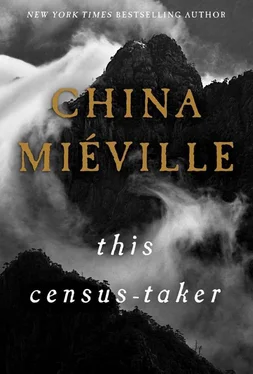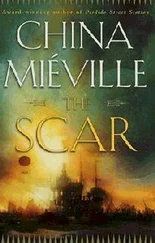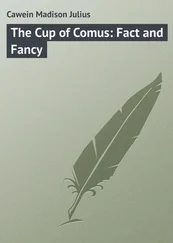This is how you catch an under-bridge bat: take a pole of hollow plastic or bamboo, two or three meters long; wind old rope or leather around one end to make your handle; attach tough wire to it, or even to a winding spool if you have the skill, and thread it all the way down the tube; pull the length-of-the-rod’s-worth of wire again from the other end, the end you won’t hold, and tie it to a hook; then bait. The best bat-bait’s a big flying insect like a beetle or a thumb-fat cricket.
The gang would lean out and dangle their batting rods and from their ends the cords would swing and circle. There’s skill in attaching the insect so you don’t kill it or harm its wings. And you mustn’t use heavy wire. If you get everything right, your cicada, or whatever you have, will try to fly away and spiral madly in the air, lurching at the limits of its line.
At dusk, the town bridge wore a beard of poles and frenetic tethered insects. The light would end and the bats wake and set off for their night business in bursts from the arches beneath us, from the bridge’s underside. They’d snap at the bugs as they passed. They’d fold their bodies around the bait to push it to their mouths — that’s how they catch things — and the hooks might snare their skins. A hunter would bring each bat in while it jerked and struggled and hurt itself, and would wring its neck, then chitter in triumphant nonsense bat-talk herself, and maybe flap her kill’s parchment wings and thrust its little body at her gangmates.
Sometimes a bat swallowed a hook. You’d haul it in on bloody wire emerging from its mouth as if it were pulled by its own elongated tongue.
The children ate the bats they caught and used their skins for many purposes. I didn’t like the blood or the death but I loved the skill of their careful casts, the wrist-flicks they used to make the bait twitch, the quick smooth drawings-in of caught bats. I didn’t like the blood or the death which sometimes put me in mind of other things, but I tried to dismiss those thoughts because the phenomena were so different, those children killing far more often and doing so with skill and to eat, or for a game or a dare.
It didn’t frighten me to walk home in the dark, though I knew there were some nocturnal things on the hill of which we should be afraid. My mother always brought a flashlight to town and on those evenings she would crank it up and send its patch of glow a few meters ahead of us, climbing it across the stones and scuttling it over the path where it would frighten or entice little life. We’d pace toward it to the pattering of insects on its glass.
My mother was never so loquacious as when she climbed at night.
“I’m a southtowner,” she said, “I grew up over there. On the other side, look at it.”
We rarely crossed the bridge. When we did we would go only a very short way into the streets on the other hill, where the shops and the people seemed different to me. That half of the town felt closer to a source of entropy.
I would risk questions. “What’s in the ravine?”
“Down there? Oh…” she said, seeming exhausted by my interruption. “I don’t know, I don’t know. I can’t tell you what’s down there.
“I’ve been all the way to the sea,” she said. “I was at the coast. There’s a…” She sketched something with her hands: a tower. “I was in an office. I don’t know why they took me. They were training me; I was doing papers for them. I could still do it if you paid me.” She walked some more and said, “I shared a house with a white hallway and glass over the door. There were seven of us lived there. It was close to the station. You’ve never seen a train.”
“In a picture,” I said. “Which side of the bridge is my father from?”
She didn’t look at me.
“There’s trains there,” she said, “where I was. I used to ride them.” She raised her hand. “The center was one thing, still carrying on, so you wouldn’t know, but the city was mostly all broken down in a circle around it. Pretty much over. You know what the sea is? The trains go right by the sea there.”
“Which side is he from?”
She considered.
“Why do you want to talk about that?” she said. Her voice was flat and I moved away. “He came from somewhere else,” she said.
“Is that why he talks different?”
“His accent. He used to think in a different language. He came to the port where I was working. He came by boat; he had to leave his own place, which is a bigger city a long way off, because of trouble there. He met me at my office. He told me he wanted to keep going, that he was only coming through. He needed to be somewhere smaller. Further away.” A tone in her voice gave me an instant’s insight into what might have been their attachment. “I took him here in the end.”
It was all the way dark now and looking back you could see how many fewer lights there were south of the divide than north. They were scattered. They sketched the streets in broken lines that curved across the slopes as if trying to encircle the bridge. They extended a kilometer up the other hill to the curious darkness of the generating station. I wondered if any of the lights shone on the house where my mother had been a child.
We heard the irate screaming of a town donkey, or a visitor’s. I could see the guttering of fires and I imagined them in the shells of south-side houses, in the rubble, in the yards of the plant where the night shift was on.
“It should be all gone,” I said. I pointed toward the failing belt. “Or all staying.”
My mother said nothing. Her flashlight lit me up.
“It should be gone or staying,” I said as I breathed out. My voice quavered a little and she looked at me. That wasn’t unfair, I thought; she gave me such careful eyes only when she sensed this kind of particularity in me, as when a cloud of starlings had gone over our house with silent motions so violent that I’d run to her and tried to tell her urgently that the birds above us should have the heads of dogs.
“You take apart all the buildings,” I said. “Take out all the bricks and push them down and set fire to them.”
“Bricks don’t burn.”
“Hot enough like in the sun they do. Right in the sun. You make them ashes.” Bats, I saw bats again, but these ones I imagined in the bricks’ ashes were as big as houses and not flying but walking in their horrid way on the tips of their wings and their claws, and the ash was baked solid so none of it gusted up at their touch. That was where they might live, the bats. Batland between the town and the hill, the country!
“Or…or pull all the rest down instead,” I said. “The middle of the town.”
“Undome the domes?” she said.
There was only one dome in the bridgetown. Maybe there were more in the coastal city and that was what she spoke of.
Do it there too, then. Take the domes down and unwind the railways until the city was all gone. It wouldn’t have to be a bad mess, you wouldn’t have to explode the buildings in the center; you could take away one brick, then the next, then the next. The grass would come back then. And the ring of ruin beyond would change again, change back, that very bit already gone into decay would unwind its decline. That’s how we could help. In a few months that would be the city, a circle of revived tower blocks around a huge field of weeds.
“That’s enough,” said my mother sharply.
I blinked and came back to myself on the dark slope, realized I’d been speaking, was quiet all the way home.
—
When Samma’s group didn’t come for me, I would accompany my mother through the town at no pace, hesitating under shops’ sun-bleached awnings, acquiring pieces without any logic I could discern. Sometimes, to my anguish, she’d enter fenced-off middens, heaps of junk and rubbish at the corners of streets, and pick through them. She wasn’t the only person to do so, but it wore on me as if she were.
Читать дальше












